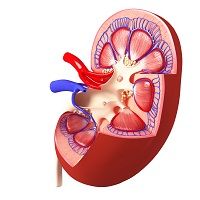Predicting Acute Kidney Injury Complications with Biomarker Test
Predicting acute kidney injury complications with biomarkers is now a viable possibility, according to research published in the Journal of the American Society of Nephrology.

Hospitals can now test and predict which patients with acute kidney injury (AKI) will develop serious kidney problems and die in the hospital — but testing early can protect patients’ health, according to research published in the Journal of the American Society of Nephrology.
Researchers from the University of Chicago and George Washington University studied 77 patients with early AKI in order to provide another tool to predict which patients with early AKI will progress to more severe stages. Currently, access to such tools is limited.
The researchers previously concluded that from the same study cohort, urine output after a furosemide stress test (FST) can predict the development of stage 3 AKI. For this study, the researchers monitored participants with early AKI who received an FST and evaluated the ability of FST urine output and biomarkers to predict the development of stage 3 AKI and other outcomes.
Furosemide is a US Food and Drug Administration approved one time dose diuretic that predominantly is used to assess certain aspects of kidney function.
After the 2 hour mark, urine output after FST was significantly better than each urinary biomarker tested in predicting stage 3 AKI, the researchers found.
“These findings may pave the way forward to robust clinical diagnostic tools for clinicians who care for patients with AKI,” study leader Lakhmir Chawla, MD, said in a press release. “In this standardized protocol, we were able to determine which patients may or may not require dialysis for acute kidney injury 1 to 3 days ahead of time.”
The authors compared using FST to assess severity of AKI to similar models used to assess patients with cardiac angina or chest pain. For those assessments, a biomarker such as troponin is used with an exercise stress test. And, just lie FST when used together with AKI biomarkers, the prediction accuracies were improved in patients with early AKI.
“It will be important to see if the predictive power of the FST remains informative for patients who are not in the critical care setting and critically ill patients,” wrote T. Clark Powell, MPH and David Warnock, MD, both of the University of Alabama at Birmingham, in an accompanying editorial. They continued that the results of the study need to be confirmed and broadened to include a larger patient population of varying stages of AKI.